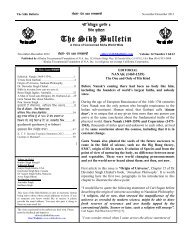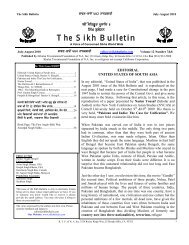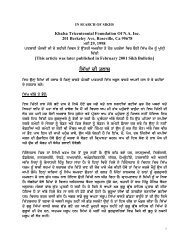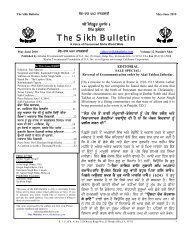You also want an ePaper? Increase the reach of your titles
YUMPU automatically turns print PDFs into web optimized ePapers that Google loves.
<strong>The</strong> <strong>Sikh</strong> <strong>Bulletin</strong> hwV-swvx 537 June-July 2005<br />
non-<strong>Sikh</strong>, so that even in such cases the marriages performed<br />
by the rites of Anand Karj may be validated and registered<br />
under the Anand Marriage Act, 1909, when the provision for<br />
registration is introduced in the Act.<br />
S. Gurdev Singh, a retired IAS officer, highlighting the<br />
emotional uneasiness of the <strong>Sikh</strong>s at the lack of a separate<br />
personal law, writes:<br />
<strong>The</strong> Muslim Personal laws based on the Holy Quran and the<br />
statutory enactments such as the Muslim Personal Law<br />
(Shariat) Application Act, 1937, the Dissolution of Muslim<br />
Marriage Act, 1939, and the Muslim Women's (Protection of<br />
Right of Divorce) Act, 1986 govern the family relationships<br />
of Muslims. <strong>The</strong> Christians are administered by the Indian<br />
Christian Marriages Act, 1872 and the Indian Divorce Act,<br />
1869 with respect to matters like marriage, divorce. <strong>The</strong><br />
Parsis, numbering hardly one lakh in India, have separate law<br />
relating to family equations, viz., the Parsi Marriage and<br />
Divorce Act, 1936. <strong>The</strong> vibrantly egalitarian <strong>Sikh</strong>s are<br />
subjected to various Hindu Laws governing succession,<br />
marriage, etc., etc., and are described Hindus through<br />
legislative ingenuity. All this cannot be savoury to the<br />
<strong>Sikh</strong>s… 10<br />
With the adoption of the two abovementioned amendments,<br />
relating to registration and scope, in the Anand Marriage Act,<br />
two major grievances of the <strong>Sikh</strong>s with the Act would be<br />
removed. However, it is desirable that the Anand Marriage<br />
Act be enlarged from its present brief version to become a<br />
full-fledged marriage code as the Hindu Marriage Act, the<br />
Parsi Marriage Act and the Christian Marriage Act are.<br />
Alternatively, the title of the Hindu Laws - the laws relating<br />
marriage, succession, guardianship, adoption etc. which are<br />
applicable to the Buddhists, Jains and <strong>Sikh</strong>s also – should be<br />
changed to give these Acts more apt titles acceptable to all<br />
the communities covered therein, keeping in view the<br />
diversity of the Indian culture and the spirit of the Indian<br />
Constitution.<br />
* B.A. (Hons.), LL.M. (Delhi), Advocate, Punjab and Haryana High Court,<br />
Chandigarh, # 767A, Sector 7B, Chandigarh. Ph.: 0172-310 5338; Email:<br />
hirdeypal@hotmail.com<br />
1. Sarfraz Khawaja, Dr., <strong>Sikh</strong>s of the Punjab 1900-1925: A Study of<br />
Confrontation and Political Mobilization (Islamabad: Modern Book<br />
Depot, 1985), p.94.<br />
2. Anand Karaj, (New Delhi: Delhi <strong>Sikh</strong> Gurdwara Management<br />
Committee), p.7.<br />
3. K.S. Talwar, <strong>The</strong> Encyclopaedia of <strong>Sikh</strong>ism, 2nd ed., Ed. Harbans<br />
Singh (Patiala: Punjabi University, Patiala, 1995), Vol. 1, p.126.<br />
4. Ibid.<br />
5. Sarfraz Khawaja, op. cit., p.96.<br />
6. Varinder Walia, “Move on Anand Karj Act: Punjab MPs meeting<br />
today,” <strong>The</strong> Tribune, Thursday, March 6, 2003, Chandigarh, India.<br />
7. “Ceremonies of Bliss: Anand Karaj & Birth of a Child, - A Review by<br />
Col. Amrik Singh (Retd.),” Abstract of <strong>Sikh</strong> Studies, July-Sept 1997,<br />
p.67.<br />
8. “<strong>Sikh</strong>s and Personal Law,” On <strong>Sikh</strong> Personal Law, Ed. Kharak Singh<br />
(Chandigarh: Institute of <strong>Sikh</strong> Studies, 1998), p.59.<br />
9. “Implications of Hindu Law Vis-à-vis <strong>Sikh</strong> Identity,” On <strong>Sikh</strong><br />
Personal Law, Ed. Kharak Singh (Chandigarh: Institute of <strong>Sikh</strong><br />
Studies, 1998), p.42.<br />
10. “<strong>Sikh</strong> Personal Law Distorted: Rectification Needed,” On <strong>Sikh</strong><br />
Personal Law, Ed. Kharak Singh (Chandigarh: Institute of <strong>Sikh</strong><br />
Studies, 1998), p.51.<br />
*****<br />
ANSWERS TO QUESTIONS OF A MUSLIM<br />
SCHOLAR<br />
[<strong>The</strong>se questions were asked by an Iranian scholar and have been conveyed<br />
by S. Saheb Singh Patwalia of Tehran on the Internet. Answers are by<br />
Kirpal Singh, USA.]<br />
Date: Vaisakh 21, 537 NS (Nanakshahi)<br />
Q1. We have heard <strong>Sikh</strong>s are Hindus. Iis it true<br />
Ans 1: No, it is not true that <strong>Sikh</strong>s are Hindus.<br />
To understand this answer, what one needs to do is to<br />
understand first, as to what is Hinduism Despite the fact<br />
that it is very difficult to precisely describe as to what<br />
Hinduism is, given below are its major pillars.<br />
1) Concept of Avtarvadha: i.e. God takes birth from time to<br />
time whenever the level of tyranny on the earth becomes<br />
unbearable.<br />
2) Concept of polytheism i.e. existence of multi god-heads;<br />
reaching a count of even 330,000,000.<br />
3) Concept of trinity i.e. existence of Lord Brahama as the<br />
Creator, Lord Vishnu as Provider, & Lord Shiva as the<br />
Destroyer.<br />
4) Idol worship i.e. God can be set up as an image.<br />
5) Chatur-Varan - <strong>The</strong> Caste system, meaning human beings<br />
are born unequal as Brahmins, Kashatryas, Vayshias, &<br />
Shudras.<br />
6) Chatur-Ashram - Four stages of Life: Renunciation being<br />
the last.<br />
7) Sanctity of Sanskrit Language as Dev-Bhasha, the<br />
language of gods.<br />
8) Mazes of mechanical rituals prescribed for different<br />
activities of life.<br />
9) Advocacy of a life of Brahamacharya (Celibacy), Yogi<br />
(renunciation), Jangam (Staying naked) etc.<br />
10) Sacredness of the cow.<br />
<strong>Sikh</strong> Philosophy advocates that none of the above pillars<br />
have any connection with a life of spirituality. <strong>The</strong>refore,<br />
basically a <strong>Sikh</strong> has no faith in any of the pillars upon which<br />
the Hindu faith is based. Hence a <strong>Sikh</strong> is not a Hindu.<br />
Q2. Guru Gobind Singh did not want to create any religion<br />
but to protect Hindus from Mugal forces he made army<br />
called Khalsa.is it true<br />
Ans 2: Please note that the founder of the <strong>Sikh</strong> faith is Guru<br />
Nanak Sahib and not Guru Gobind Singh Jee. <strong>The</strong>refore, the<br />
question of Guru Gobind Singh Jee starting a new religion<br />
does not arise. All that Guru Gobind Singh Jee did was to<br />
preach what Guru Nanak Sahib taught. Khalsa is the<br />
K.T.F. of N.A. Inc. 3524 Rocky Ridge Way, El Dorado Hills, CA. 95762 11
















